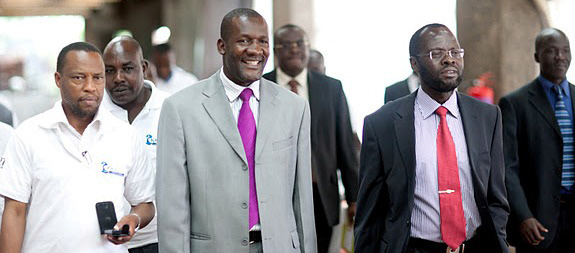Increasing Laboratory Supply Chain Transparency, Kenya Takes Bold Steps
For many years, health ministries and international aid organizations have worked to strictly regulate the quality and supply of medical drugs provided in low-income countries, understanding that substandard drugs pose threats not only to individual patients, but also on a societal level by cultivating drug-resistance. However, equal attention has rarely been given to reforming the medical diagnostics industry, where many of the same dangers are regularly encountered. Low-quality diagnostics that yield false negatives may cause hospital or laboratory staff to miss early signs of an outbreak, while false positives can result in wastage of valuable medications. In addition, misdiagnoses can lead doctors to over-medicate or under-medicate patients, reducing the quality of care and creating a breeding ground for drug resistance.
The diagnostics industry suffers from many of the same faults as the more closely monitored drug industry. Manufacturers and suppliers operating in low-income countries are not always required to adhere to international standards, with governmental authorities imposing insufficient quality control. Even when adequate standards are theoretically required, ministries of health may lack the financial or legal resources to thoroughly implement these standards; in addition, interconnections between the industry, procurement agency and quality control boards may provide incentives that result in poor quality diagnostics reaching the market. A general shortage of diagnostic equipment also creates demand for unscrupulous back-alley vendors, who peddle low-quality diagnostics with no oversight. Individual consumers and laboratories alike may be forced to choose between under-regulated companies and completely unregulated black market sources.
Diagnostics also face a unique hurdle once equipment reaches the laboratories. Because diagnostics require professional training for effective use, even high-quality equipment can be rendered ineffective if laboratory staff is unprepared to operate it. Many regions distant from city centres suffer chronic shortages of qualified professionals to train laboratory technicians in the use of new diagnostic methods and equipment. Tragically, the increasing availability of more advanced medical technology can compound this problem, as laboratories, clinics and hospitals receive the latest diagnostics but no guidance in their operation.
In Kenya, fortunately, the Ministry of Health is setting a sterling example of a systematic approach to addressing the challenges that disrupt the field of diagnostics. Under the leadership of the Hon. Minister for Medical Services, Prof. Anyang Nyong’o, the Ministry has launched an aggressive campaign to implement and enforce international standards for the industry, providing careful oversight on both a national and local level. The key element of his initiative is increasing transparency in the health care industry. As Dr. Michael Wanga, Chief of Staff of the Ministry for Medical Services, told ASLM in an interview, “Lack of transparency means compromising standards through bribery, dubious registration of personnel, shortcut ways of licensing institutions and lack of a score card or checklist to inspect the laboratories.”
In pursuit of higher standards of transparency, Prof. Nyong’o has recently taken two bold measures to reform the practice of diagnostic regulation in Kenya. First, he dissolved the Kenya Medical Laboratory Technicians and Technologists Board (KMLTTB), under the suspicion of inappropriate ties to manufacturers and suppliers. He invited the Efficient Monetary Unit to investigate the Board’s activities, and after six months, incorporating the Unit’s recommendations, created a new Board to be the sole laboratory regulatory body in Kenya. Prof. Nyong’o has extended partnerships with the new KMLTTB to several international donor agencies…
Select “Download” (in the top right margin) to read the full article.
Originally published in the November 2011 issue of Lab Culture newsletter. Content created and coordinated by the GSSHealth team.

